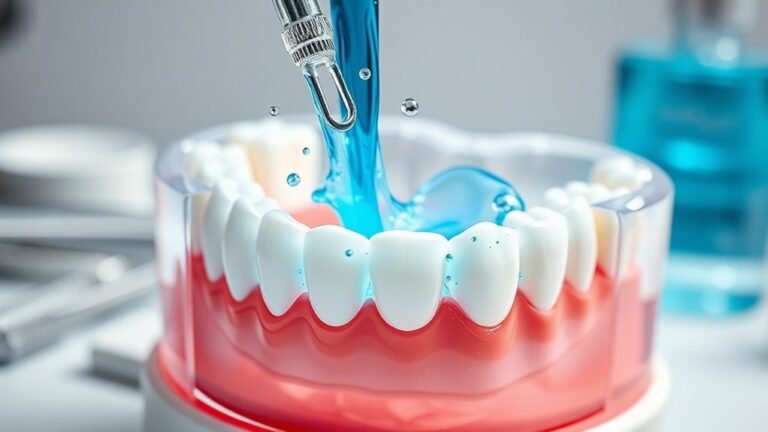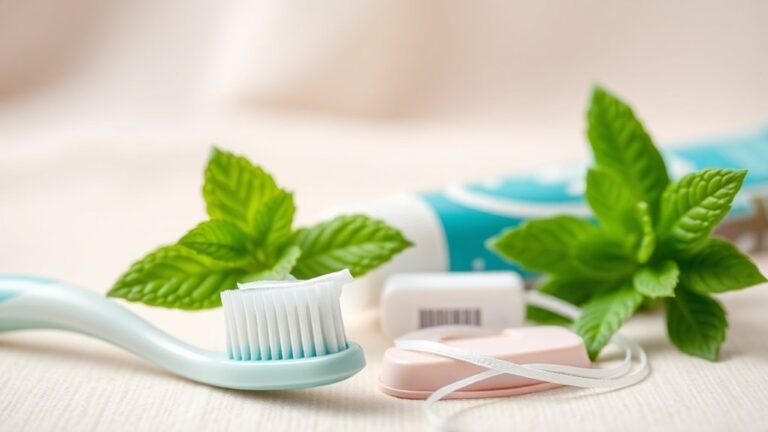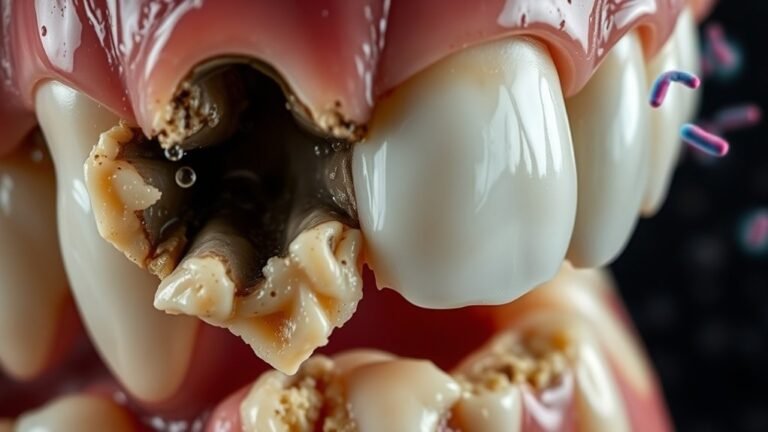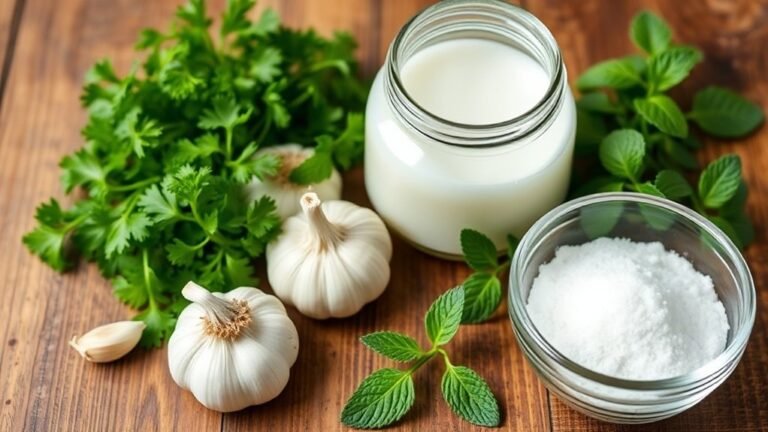Natural Oils and Remedies Fight Bacteria Responsible for Tooth Decay
Natural oils, like clove, tea tree, and peppermint, effectively fight the bacteria responsible for tooth decay. These oils possess strong antimicrobial properties that combat harmful microorganisms, reduce plaque formation, and promote gum health. Incorporating oil pulling, mixing oils with toothpaste, or using them in mouthwash can greatly enhance your oral hygiene routine. These practices can lower your risk of cavities and improve breath freshness. Learn more about incorporating these oils and other remedies into your dental care routine.
Key Takeaways
- Essential oils like clove, tea tree, and peppermint possess antimicrobial properties that effectively combat bacteria causing tooth decay.
- Oil pulling with coconut or sesame oil helps reduce harmful bacteria and plaque while promoting overall oral health.
- Adding a few drops of tea tree oil to toothpaste enhances its antibacterial effects and supports gum health.
- Using clove oil on floss increases its effectiveness in preventing gum disease and soothes sensitive gums.
- Massaging gums with a blend of eucalyptus and olive oil promotes circulation, reduces inflammation, and strengthens gum tissue.
Understanding Tooth Decay and Its Causes
Tooth decay occurs when bacteria in your mouth produce acids that erode tooth enamel, leading to cavities. Understanding the causes of tooth decay is essential for effective tooth decay prevention. Poor oral hygiene, sugary diets, and insufficient fluoride exposure can increase the risk of decay. To combat these issues, you can incorporate natural oils known for their antibacterial properties, like coconut oil or tea tree oil, into your routine. These oils can help fight harmful bacteria in your mouth, reducing the risk of decay. Regular brushing and flossing, combined with these natural remedies, can greatly improve your oral health. By actively engaging in tooth decay prevention, you can maintain a healthier smile and protect your teeth from damage.
The Role of Bacteria in Tooth Decay
Bacteria play a vital role in tooth decay, primarily through their metabolic processes. When you consume sugars, harmful bacteria feed on them and produce acids that erode tooth enamel. Understanding the types of these bacteria and their acid production is essential for effective prevention and treatment.
Types of Harmful Bacteria
How do harmful microorganisms contribute to the onset of tooth decay? Two primary types of bacteria, Streptococcus mutans and Lactobacillus, play crucial roles in this process. Streptococcus mutans is known for its ability to adhere to tooth surfaces and form biofilms, creating an environment conducive to decay. Lactobacillus, on the other hand, thrives in acidic conditions and accelerates the decay process once it begins. By understanding these harmful bacteria, you can take proactive steps to protect your dental health. Natural remedies, such as essential oils with antibacterial properties, can help combat these microorganisms effectively. Regular oral hygiene and the use of these remedies can considerably reduce the risk of tooth decay and promote a healthier mouth.
Bacterial Metabolism and Acid Production
When harmful bacteria like Streptococcus mutans and Lactobacillus metabolize sugars, they produce acids as byproducts, which considerably contributes to tooth decay. These acids lower the pH in your mouth, leading to demineralization of tooth enamel. Over time, this process can result in cavities and other dental issues.
Here’s a quick overview of the bacteria involved and their effects:
| Bacteria | Sugar Metabolism | Acid Produced |
|---|---|---|
| Streptococcus mutans | Glucose, Sucrose | Lactic Acid |
| Lactobacillus | Lactose, Sucrose | Lactic Acid |
| Actinomyces | Glucose, Fructose | Acetic Acid |
| Bifidobacterium | Fructose, Glucose | Lactic Acid |
Understanding this metabolic process highlights the importance of maintaining oral hygiene and considering natural remedies to combat these bacteria.
Essential Oils With Antimicrobial Properties
Essential oils like clove, tea tree, and peppermint have strong antimicrobial properties that can help combat tooth decay. Clove oil is known for its pain-relieving and antibacterial effects, while tea tree oil effectively reduces harmful bacteria in the mouth. Peppermint oil not only freshens breath but also possesses antimicrobial benefits that support oral health.
Clove Oil Benefits
Although many people seek natural alternatives for dental care, clove oil stands out for its remarkable antimicrobial properties. It contains eugenol, a compound known for effectively combating oral bacteria that contribute to tooth decay and gum disease. When you incorporate clove oil into your dental routine, you can help reduce plaque buildup and promote healthier gums. Its anti-inflammatory properties also assist in alleviating pain associated with toothaches, making it a go-to remedy for discomfort. Additionally, clove oil’s natural antiseptic qualities can help prevent infections, offering peace of mind. To use, simply dilute a few drops in a carrier oil and apply it to affected areas or add it to your mouthwash for added protection against harmful bacteria.
Tea Tree Efficacy
While many natural remedies offer potential benefits for oral health, tea tree oil has gained recognition for its powerful antimicrobial properties. This essential oil can help combat bacteria that contribute to tooth decay, making it a valuable addition to your oral care routine. When using tea tree oil, you might notice:
- A stimulating, invigorating scent that uplifts your spirits
- A soothing sensation that soothes inflamed gums
- A reduction in plaque buildup, promoting healthier teeth
- A natural way to fight bad breath effectively
- Antiseptic properties that can help prevent infections
Incorporating tea tree oil into your regimen can enhance your oral hygiene, offering a natural, effective approach to maintaining healthy teeth and gums.
Peppermint Properties
Following the exploration of tea tree oil, peppermint oil emerges as another powerful natural remedy with notable antimicrobial properties. You’ll find that peppermint oil contains menthol, which not only provides a revitalizing taste but also exhibits antibacterial effects. This oil effectively combats harmful bacteria associated with tooth decay, making it a valuable addition to your oral care routine. When diluted and used in mouthwashes or toothpaste, peppermint oil can help reduce plaque formation and improve overall oral hygiene. Additionally, its natural cooling sensation can soothe gum irritation. Incorporating peppermint oil into your daily regimen may enhance your dental health and contribute to fresher breath, ensuring you maintain a confident smile. Embrace the benefits of this essential oil for peak oral care.
How to Use Natural Oils for Oral Health
Natural oils offer a range of benefits for oral health, and incorporating them into your daily routine can enhance your dental hygiene. Here are some effective ways to use these oils:
- Oil Pulling: Swish a tablespoon of coconut oil for 10-20 minutes to remove bacteria.
- Toothpaste Additive: Add a drop of tea tree oil or peppermint oil to your regular toothpaste.
- Mouthwash: Mix a few drops of clove oil with water for a natural mouth rinse.
- Gum Massage: Apply a small amount of eucalyptus oil to your gums to promote healing.
- Flavoring: Add a drop of cinnamon oil to your water for a revitalizing taste and antibacterial properties.
Other Natural Remedies for Supporting Dental Hygiene
Incorporating various natural remedies can greatly enhance your dental hygiene routine. Consider using baking soda as a gentle abrasive, which can help remove surface stains and neutralize acids in your mouth. Aloe vera gel is another excellent option; it has antibacterial properties and can soothe gum irritation. You might also try adding a few drops of tea tree oil to your toothpaste, as it’s known for its antimicrobial effects. Additionally, green tea is rich in antioxidants and can reduce plaque buildup, improving overall oral health. Finally, don’t overlook the benefits of a nutrient-rich diet, focusing on foods high in calcium and vitamin D, which support strong teeth and bones. These remedies can pave the way for a healthier smile.
Incorporating Natural Oils Into Your Daily Routine
As you look to enhance your dental care routine, integrating natural oils can offer significant benefits for oral health. These oils not only combat bacteria but also promote healthier gums and fresher breath. Here are a few simple ways to incorporate them into your daily regimen:
Enhance your dental care by integrating natural oils for healthier gums and fresher breath.
- Oil pulling: Swish coconut or sesame oil for 10-20 minutes each morning.
- Toothpaste addition: Mix a few drops of tea tree oil into your regular toothpaste.
- Mouthwash: Create a natural mouthwash with peppermint oil and water.
- Daily flossing: Use a drop of clove oil on your floss for added protection.
- Massage gums: Gently massage a blend of eucalyptus and olive oil on your gums.
Frequently Asked Questions
Are Natural Oils Safe for Children’s Dental Care?
Yes, natural oils can be safe for children’s dental care when used appropriately. Always consult a pediatric dentist before introducing any new products, ensuring they’re suitable for your child’s age and specific dental needs.
Can Essential Oils Replace Traditional Toothpaste?
Essential oils can’t fully replace traditional toothpaste. Studies show that while they can reduce bacteria, they lack fluoride, which strengthens enamel. You should use them as a supplement, not a substitute, for ideal dental health.
How Long Until I See Results From Using Natural Oils?
You’ll likely notice results within a few weeks of consistent use, but full benefits may take longer. Regular application and proper oral hygiene practices will enhance effectiveness and speed up visible improvements in your oral health.
Are There Any Side Effects of Using Essential Oils?
Yes, there can be side effects from using essential oils, including skin irritation, allergic reactions, or gastrointestinal issues if ingested. Always dilute oils properly and perform a patch test before applying them to your skin.
Can I Mix Different Essential Oils for Oral Health?
Yes, you can mix different essential oils for oral health. Just guarantee you’re using safe, high-quality oils and follow recommended dilution guidelines to avoid irritation. Always consult with a healthcare professional if unsure.
Conclusion
Incorporating natural oils into your daily oral hygiene routine can be like adding a secret weapon to your dental arsenal. Just as a shield protects a knight in battle, these oils help fight off the bacteria responsible for tooth decay. By harnessing the power of essential oils and other natural remedies, you can enhance your dental health and keep your smile bright. Embrace these holistic approaches and take charge of your oral health for a healthier future.






